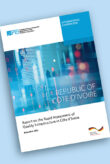The Physikalisch-Technische Bundesanstalt (PTB) has published a new assessment report providing an analysis of the national quality infrastructure (NQI) of Zambia. PTB is supporting the implementation of a long-term strategy called “Quality for Africa” within the scope of the Pan-African “Upgrading of Quality Infrastructure in Africa” project. One of the objectives is to assist the institutions of the Pan-African Quality Infrastructure (PAQI) in assessing NQI systems in several countries, including Zambia. These assessments will be used to inform policy makers and other interested parties, allowing them to identify development potential and further enhance NQI systems.
Methods of analysis for this assessment included a gathering of available data, information research, and virtual interviews with stakeholders. The interviews were conducted using the Quality Infrastructure (QI) Rapid Diagnostic Tool, a tool developed by the World Bank and PTB which enables a fast but less detailed assessment of a country’s QI.
The analysed data shows, on the one hand, that the southern African country’s NQI is not yet fully established and in need of improvement as well as further development. On the other hand, positive steps have been taken in Zambia, for example the adoption of the National Quality Policy of 2010, to streamline the QI institutions along the lines of international best practice. Recommendations to further enhance the NQI are also discussed in this report.
A fit-for-purpose and internationally recognized NQI is an essential necessity for all countries to realize trade objectives, particularly in a world in which the strategic importance of standards, technical regulations, and conformity assessment systems is increasing. A non-robust NQI eventually affects trade and the effective participation in regional and global value chains.
The assessment report for Zambia can be downloaded using the following link:








